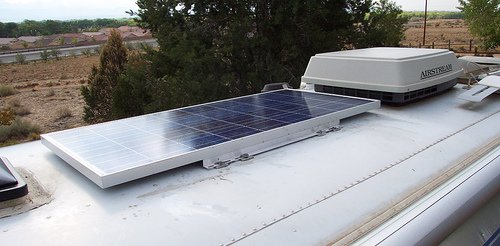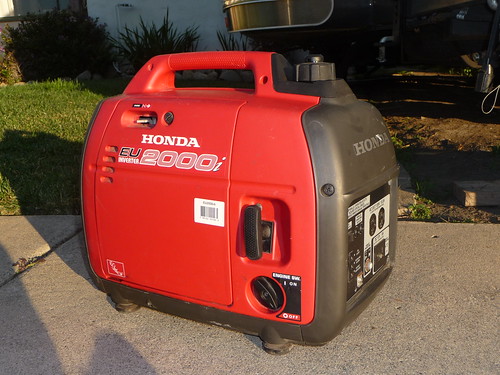While I am on a little bit of a boondocking roll, let me share my two cents on this ongoing discussion: Generator or Solar. It is really not a debate on whether one is better than the other. There are plenty of folks who’ve decided to use both technologies. For those of us who are on a budget, the main reasons to choose are the cost and storage availability.

A 120 watt panel mounted atop a late model Airstream

The ‘New-To-Us’ Honda EU2000i Generator
This topic is very subjective and every RV’er has an opinion on what works best for them. The information here might be very rudimentary for a seasoned traveler but hopefully it will help some of the new comers to the RV lifestyle. This post does not attempt to sway people from one side to the other but rather to pose the pros and cons of each option and let the readers themselves make their own decision.
I have asked this question to a lot of my Airstream friends I have met over the last few months. Most of them have their own reasons for why and which they have picked. Rich, from Airstream Life magazine, and I had a conversion about just this topic when he graciously invited us to his house on our trip to Tucson. He had recommended that the best first step is to increase our battery capacity before deciding which power source to choose. I could not agree more and it is part of the reason why I am going to make room and bring my portable battery bank along with us. My implementation of added battery capacity is the least costly option to extend a boondocking vacation. It does not require any modification to the trailer and with readily available parts, anyone can build one in a couple of hours.
Assuming your battery capacity is to your satisfaction, the next step is finding a way to fill them back up when they are low. A generator user might know that it is best to run the generator while the power usage is at its peak rather than trying to replenish the batteries after heavy use. The charging mechanism in trailers are not the most efficient when powered by a generator and you will probably get the most benefit by using the power that is being generated than trying to charge it back into the batteries. Solar panels on the other hand can be very efficient depending on the type of charge controller used. Most modern charge controllers today is of the MPPT (maximum power point tracker) variety and they are great at managing the power output of the panels to replenish your batteries. These are a couple of examples how the two options can be fundamentally different and someone using both systems can benefit differently from both if budget and space allows.
To best quaify which system might be ideal for those of us not made of money, I have outlined below the pros and cons of each. Feel free to add your own to the comments if you feel that any are missing. The solar option assumes a fixed rooftop installation and the generator assumes ample wattage for microwave and AC unit.
Generator – Pro:
- Works in the dark or shade
- Powers more equipment such as AC and microwave
- Portable so you can use it even when you are not RV’ing
- Less expensive than solar (when considering labor costs for installation of solar)
- Requires no installation
Generator – Con:
- Takes time to set up
- Needs storage space
- Needs refueling
- Requires regular maintenance
- Produces exhaust and carbon monoxide
- Can be very noisy
- Some campgrounds ban generators altogether for some of the reasons listed above
- Inefficient at charging batteries
Solar Panel – Pro:
- Easy maintenance
- Can be permenantly installed with no need for storage space
- No refueling trips on long stays
- Last a long time when taken care of
- No set up required when permenantly installed
- Completely silent
- Environmentally friendly
- Efficient at replenishing battery banks
Solar Panel – Con:
- Does not power any 110 volt equipment (without an inverter)
- Does not work, or work well, in shade or darkness
- More costly to purchase and install
- Requires ample roof top space
- Needs ladder access to panels to angle them for maximum performance
I hope this helps someone out there who is deciding where to spend their hard earn dollar in today’s tough economy. Being self-reliant in your power needs doesn’t just save you money in the long run to allow you to camp for less in regular sites. The most important benefit is that you will be able to visit many more beautiful places where electrical hook ups just do not exist. Speaking of beautiful place, I gotta start packing for a long weekend at the beach in the Airstream.
over and out,
dan



4 Comments
Rich · February 19, 2009 at 4:17 am
Great analysis, Dan. I would add that for people who have both generator and solar, the most efficient way to charge the batteries each day is to run the generator in the morning for while, then let solar do the remaining charge over the course of the day. The reason stems from two facts:
1) Even at idle, the generator produces far more power than the batteries can accept.
2) The amount of recharge energy (amperage) the batteries will accept is inversely proportional to their state of charge. In other words, charging slows down as the batteries get fuller.
You can best optimize this output by using the generator when the batteries are at their lowest charge. That’s when they will accept the maximum amount of power (amperage) from the generator. Later in the day, when they are more charged and willing to accept only a slower rate of recharge, the solar panels and the MPPT controller finish the job much more efficiently.
Doing it in the opposite order (i.e., charging on solar all day and then running the generator to “top off”) is a near-total waste of fuel. The generator will make noise and fumes but with a good amp-hour meter you can tell that not much power is actually getting to the batteries. The voltage-based meter in a typical RV will indicate good battery charge for a while, because the meter isn’t accurate, but it won’t last long. Because voltage is not an accurate way of measuring the state of battery charge while you are using the RV, I recommend that anyone who installs solar or camps without electric hookups, install an amp-hour meter instead.
COAL · July 1, 2009 at 8:44 am
I too have had a hard time figuring if solar panels are worth the expense. I installed a HOnda Eu 3000 generator and that powers 2 Iota 45 amp three stage charges to recharge 4 6 six volt on board deep cycle batteries. I also have a 1000 watt inverter to run the bedroom tv and dvd player.
After running the fiver for 24 hours, the Honda recharges the batteries in about 2 hours. Cost of fuel 2 litres. All this during the cold Ontario winter, as we ended up without land power or water for approx 6 weeks.
I would have to spend upwards of 5000.00 on solar to have a system where I don’t have to worry about power availability during the winter months. During the coldest part of the winter, the furnace pretty much runs constant. After 24 hours my batteries are sitting around 50-60 %.
A dual system as mentioned where one would run the generator to recharge to about 85 % battery capacity and then have the solar take over from there appeals to me.
At any rate, good post and feel free to check out my rv adventures and winter rv living at my blog.
Angela · August 30, 2017 at 3:24 am
Generator or solar panel both need a strong roof to be placed . If you use RV Liquid Roof Repair to protect it , it will enhance energy efficiency too and your energgy consumption will be decreased.
Liquid Roof Coatings · October 31, 2017 at 11:59 pm
New and precise thoughts were shared and have to be favored as far as roof preservation is involved Roof Coatings is quality to select.